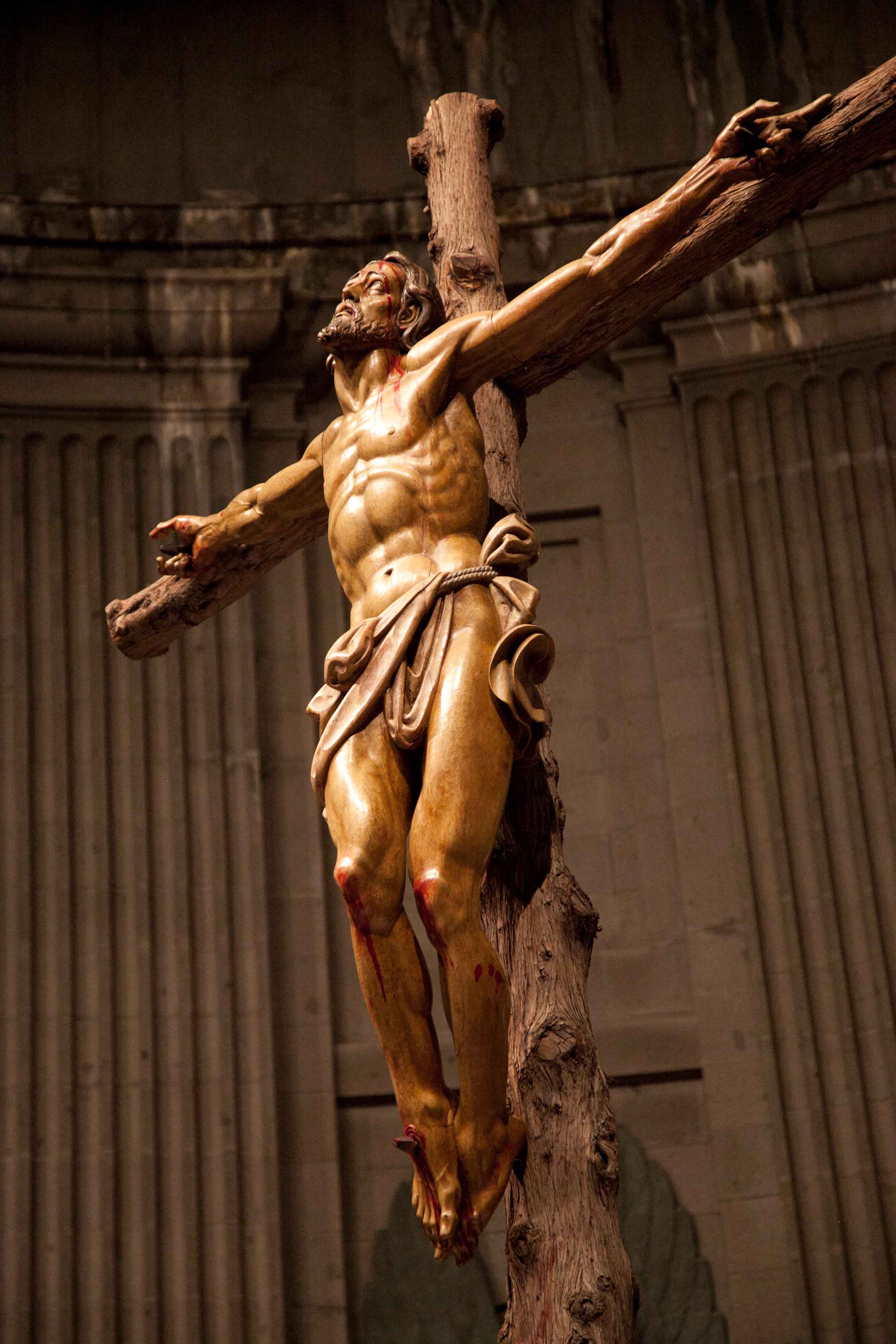“The Cross is both vertical and horizontal.” These words stirred me. “Wow, God really thought of everything,” I thought. I’m reminded of both orientations of the Cross by the last line of today’s Gospel, “Be perfect, as your Heavenly Father is perfect.”
For years, I thought that just meant to strive for less sin and more holiness. “Lord, I can’t be perfect, but I try,” I said for years, as I misinterpreted this Scripture. To be sure, the last line of today’s Gospel IS about sinning less, in a way. But that’s not all it’s about, and that’s the genius of Our Lord and Scripture.
The word that translates to “perfect” in English actually means “whole”, “full”, or “complete”. So, it isn’t just about being less sinful, though that is a wonderful goal to strive for! Instead, the last line of today’s Gospel exhorts us to bring about the Kingdom of God fully – so we can experience it in the here and now.
Jesus exhorts us to love both God and our neighbors. We need a vertical relationship with God, and we need horizontal relationships with our neighbors to fully realize the Kingdom.
So, to be whole, full, or complete, we need both/and, not either/or. We need the vertical and the horizontal. Too many times, we act in ways which fail to realize the both/and of the Kingdom, in ways that only emphasize loving God and rejecting neighbor, or embracing our neighbor but forgetting the importance of the love of God.
Indeed, we need the Cross of Jesus to remind us to be oriented in both ways. And we need the Cross of Jesus to redeem us when we fall short. Today, let’s thank the Lord for the gift of the Cross, for the ability to see the new in the familiar, and pray that we might bring about the Kingdom through the “both/and”.
“La Cruz es a la vez vertical y horizontal”. Estas palabras me conmovieron. “Vaya, Dios realmente pensó en todo”, pensé. La última línea del Evangelio de hoy me recuerda ambas orientaciones de la Cruz: “sean perfectos, como su Padre celestial es perfecto”.
Durante años, pensé que eso sólo significaba luchar por tener menos pecado y más santidad. “Señor, no puedo ser perfecto, pero hago el intento”, decía durante años, mientras malinterpretaba esta Escritura. Sin duda, la última línea del Evangelio de hoy se trata de pecar menos, de cierto forma, pero eso no solamente se trata de eso, y ese es el genio de Nuestro Señor y las Escrituras.
La palabra que se traduce como “perfecto” en español en realidad significa “entero”, “pleno” o “completo”. Por lo tanto, no se trata sólo de ser menos pecador, ¡aunque es una meta maravillosa por la que esforzarse! En cambio, la última línea del Evangelio de hoy nos exhorta a realizar plenamente el Reino de Dios, para que podamos experimentarlo aquí y ahora.
Jesús nos exhorta a amar tanto a Dios como a nuestro prójimo. Necesitamos una relación vertical con Dios y necesitamos relaciones horizontales con nuestro prójimo para realizar plenamente el Reino.
Entonces, para que seamos enteros, plenos o completos, necesitamos ambos/y, no uno/o otro. Necesitamos la vertical y la horizontal. Demasiadas veces actuamos de maneras que no logramos realizar el ambos/y del Reino, de maneras que solo enfatizan amar a Dios y rechazar al prójimo, o abrazar a nuestro prójimo pero olvidando la importancia del amor de Dios.
De hecho, necesitamos la Cruz de Jesús para recordarnos que debemos orientarnos en ambos sentidos. Y necesitamos la Cruz de Jesús para redimirnos cuando fallamos. Hoy, agradezcamos al Señor por el regalo de la Cruz, por la capacidad de ver lo nuevo en lo familiar, y oremos para que podamos realizar el Reino a través del “ambos/y”.
 Mary Thissen is a St. Louis native living in East Central Illinois with her husband and children. She is blessed with twin boys Earthside and four children now living in Heaven. When she is not working as a healthcare data analyst or caring for her boys, she enjoys studying and writing about the Catholic faith and ministering to women who are suffering through miscarriage or infertility. You can connect with Mary on Instagram @waitingonmiracles.
Mary Thissen is a St. Louis native living in East Central Illinois with her husband and children. She is blessed with twin boys Earthside and four children now living in Heaven. When she is not working as a healthcare data analyst or caring for her boys, she enjoys studying and writing about the Catholic faith and ministering to women who are suffering through miscarriage or infertility. You can connect with Mary on Instagram @waitingonmiracles.
Feature Image Credit: Matías Medina, cathopic.com/photo/63-jesus-crucified


 Heather Orlowski and her husband are busy parents of two little girls (ages 2 and 4). The Catholic Church holds a special place in her heart and in her entire life. She attended Catholic schools from Kindergarten through college. She graduated from Aquinas College with a degree in Elementary/Special Education. Catholic Education is very important to her and she now teaches 1st and 2nd grades at St. Therese Catholic School. In her free time, she loves creating memories with her family and watching her little girls play soccer.
Heather Orlowski and her husband are busy parents of two little girls (ages 2 and 4). The Catholic Church holds a special place in her heart and in her entire life. She attended Catholic schools from Kindergarten through college. She graduated from Aquinas College with a degree in Elementary/Special Education. Catholic Education is very important to her and she now teaches 1st and 2nd grades at St. Therese Catholic School. In her free time, she loves creating memories with her family and watching her little girls play soccer. 
 Dr. Alexis Dallara-Marsh is a board-certified neurologist who practices in Bergen County, NJ. She is a wife to her best friend, Akeem, and a mother of two little ones on Earth and two others in heaven above.
Dr. Alexis Dallara-Marsh is a board-certified neurologist who practices in Bergen County, NJ. She is a wife to her best friend, Akeem, and a mother of two little ones on Earth and two others in heaven above.


 Merridith Frediani loves words and is delighted by good sentences. She also loves Lake Michigan, dahlias, the first sip of hot coffee in the morning, millennials, and playing Sheepshead with her husband and three kids. She writes for Catholic Mom, Diocesan.com, and her local Catholic Herald. Her first book Draw Close to Jesus: A Woman’s Guide to Adoration is available at Our Sunday Visitor and Amazon. You can learn more at
Merridith Frediani loves words and is delighted by good sentences. She also loves Lake Michigan, dahlias, the first sip of hot coffee in the morning, millennials, and playing Sheepshead with her husband and three kids. She writes for Catholic Mom, Diocesan.com, and her local Catholic Herald. Her first book Draw Close to Jesus: A Woman’s Guide to Adoration is available at Our Sunday Visitor and Amazon. You can learn more at 


 David Dashiell is a freelance author and editor in Nashville, Tennessee. He has a master’s degree in theology from Franciscan University, and is the editor of the anthology
David Dashiell is a freelance author and editor in Nashville, Tennessee. He has a master’s degree in theology from Franciscan University, and is the editor of the anthology 
 Elizabeth Tomlin is the author of Joyful Momentum: Building and Sustaining Vibrant Women’s Groups and contributing author to the Ave Prayer Book for Catholic Mothers. She is General Counsel for the Archdiocese for the Military Services, USA. Elizabeth is an Army wife and mother of three and currently lives in the DC area. She blogs at
Elizabeth Tomlin is the author of Joyful Momentum: Building and Sustaining Vibrant Women’s Groups and contributing author to the Ave Prayer Book for Catholic Mothers. She is General Counsel for the Archdiocese for the Military Services, USA. Elizabeth is an Army wife and mother of three and currently lives in the DC area. She blogs at 


